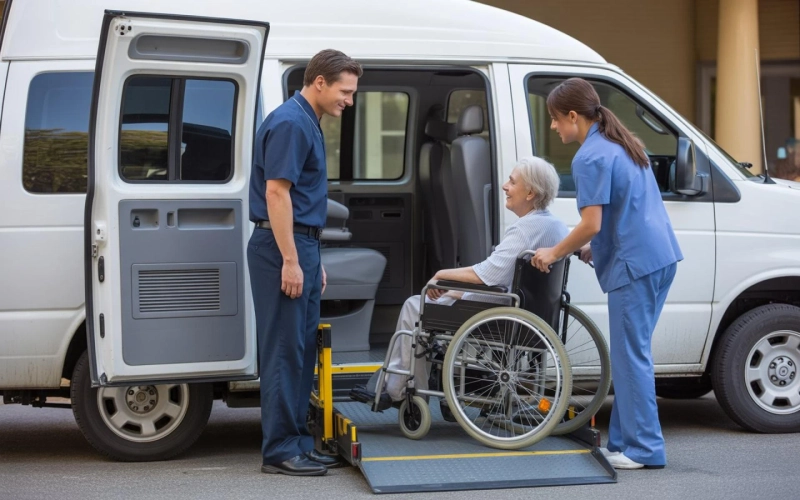For many individuals with mobility challenges, a routine doctor's appointment is anything but routine. The simple act of getting there can be a monumental hurdle. While emergency services have their clear place, it's the non-emergency medical appointments—the dialysis treatments, the physical therapy sessions, the crucial check-ups—that form the backbone of long-term health management.
This is where specialized wheelchair transportation moves from a convenience to an absolute necessity. It’s not just about a vehicle with a ramp; it’s a vital link in the healthcare chain that empowers independence, ensures safety, and promotes overall well-being.
The Hidden Hurdles of Standard Transportation
Imagine you rely on a wheelchair for mobility. How do you get to your cardiologist appointment across town?
- Standard Taxis/Rideshares: Most are not equipped with wheelchair ramps or securement systems. The process of transferring can be painful, dangerous, or simply impossible without the right equipment and trained assistance.
- Public Transit: While improving, access can be inconsistent. Routes may be indirect, vehicles crowded, and the experience physically taxing and stressful.
- Asking Family or Friends: This often means relying on others to take time off work, which can lead to feelings of guilt and dependency. They may also lack the proper vehicle or training to assist safely.
These barriers are more than just inconveniences; they directly impact health outcomes.
Why Specialized Wheelchair Transportation is a Game-Changer
Professional non-emergency medical transportation (NEMT) services that specialize in wheelchair access are designed to eliminate these hurdles. Their role is multifaceted and profoundly impactful.
1. Safety and Dignity Above All
The primary concern is safe, dignified transport. These services use vehicles with hydraulic lifts or ramps, avoiding risky transfers. Drivers are specifically trained in securement techniques, wheelchair operation, and patient assistance, ensuring a smooth and secure journey from door to door. This preserves the rider's physical safety and their personal dignity.
2. Enabling Consistent Care and Better Health Outcomes
The most direct role of this transportation is enabling patients to keep their appointments. When transportation is reliable, patients are more likely to:
- Attend scheduled specialist visits.
- Receive life-sustaining treatments like dialysis or chemotherapy on time.
- Adhere to physical therapy regimens, which is crucial for recovery and maintenance.
- Get to preventative care screenings, catching potential issues early.
In short, reliable transportation is a direct contributor to better long-term health outcomes and can reduce costly emergency room visits down the line.
3. Reducing Physical and Emotional Strain
For a patient managing a chronic condition, conserving energy is crucial. The stress and physical exertion of arranging and enduring an unsuitable ride can be debilitating. A dedicated, accessible transport service removes this burden, allowing the patient to arrive at their appointment feeling calm and prepared, not exhausted and anxious.
4. Providing Peace of Mind for Families
The role of wheelchair transportation extends to caregivers and family members. It offers them immense peace of mind, knowing their loved one is in capable hands. It alleviates the logistical and emotional pressure, freeing them to provide support in other ways without the constant worry about how to get to the next appointment.
5. Fostering Independence and Social Connection
While the focus is on medical appointments, the independence granted by these services often extends further. Knowing that a reliable, safe ride is available can empower individuals to engage more in their community, reducing feelings of isolation and improving their overall quality of life.
What to Look For in a Quality Service
Not all services are created equal. When choosing a wheelchair transportation provider, look for:
- Certified and Trained Drivers: Ensure staff are trained in patient assistance and securement.
- Properly Maintained Vehicles: Vehicles should be equipped with lifts/ramps and regular maintenance records.
- Punctuality and Reliability: Look for a service with a reputation for being on time.
- Insurance and Licensing: The company should be fully insured and compliant with all local and federal regulations (like the ADA).
- Clear Communication: A good service will provide clear pickup times and updates.
A Vital Link in the Healthcare Ecosystem
Wheelchair-accessible transportation for non-emergency medical appointments is far more than a logistical service. It is a critical component of equitable healthcare access. It bridges the gap between a patient's home and the care they need to thrive. By ensuring safe, reliable, and dignified travel, we don't just transport individuals; we uphold their right to health, their independence, and their quality of life.
It’s a service that truly moves people—not just from point A to point B, but toward a healthier, more engaged future.


